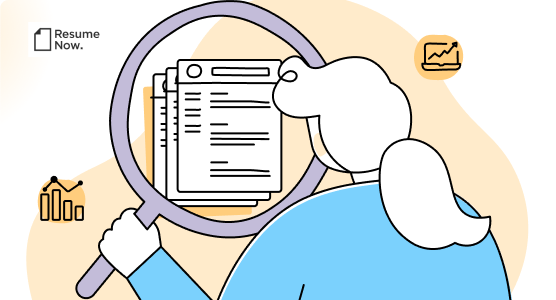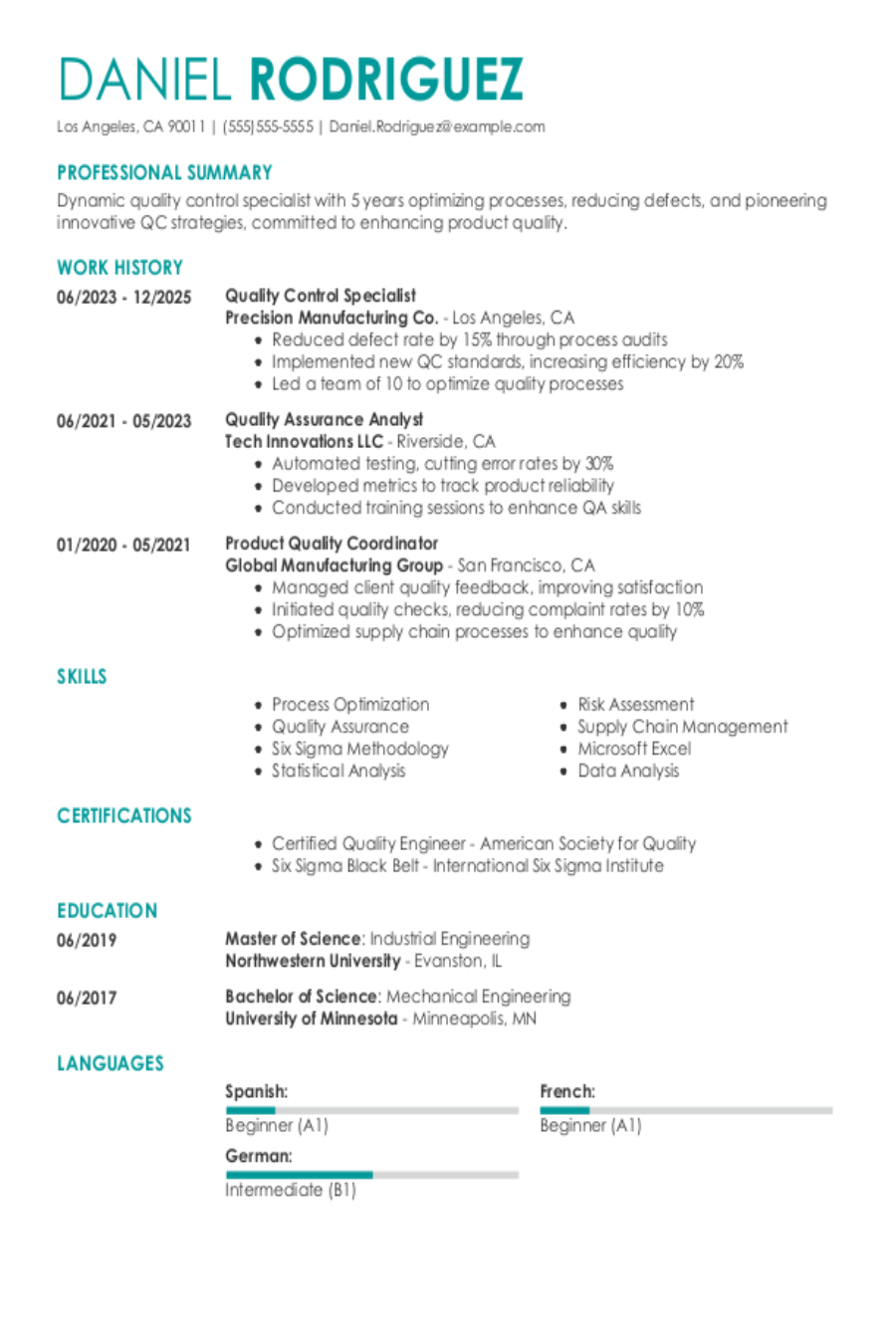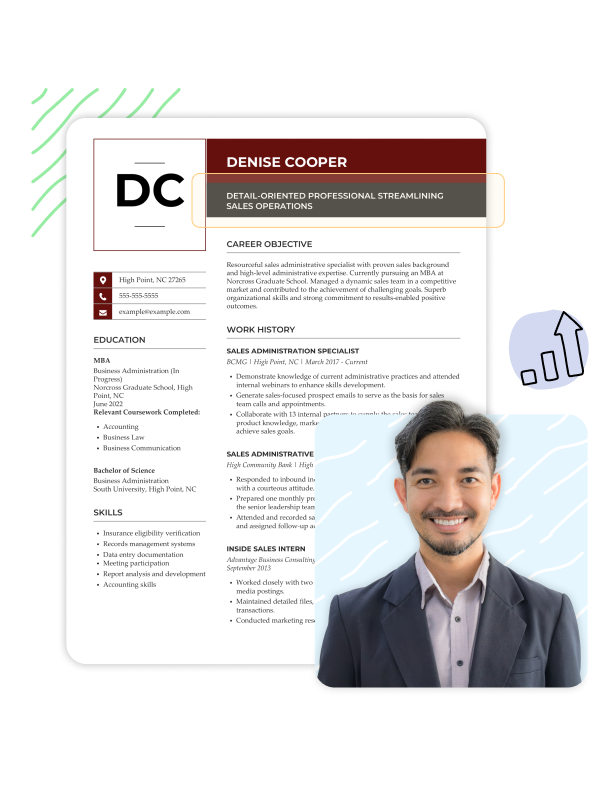Think of your resume as the front page of a newspaper where your name is the byline. Now, what’s the headline?
Your resume headline is right under your name. Much like a resume profile, a resume headline is a brief but compelling introduction to your resume that summarizes your career and entices the hiring manager to keep reading.
This guide will cover:
- The definition of a resume headline
- Examples of resume headlines
- How to write a resume headline
- Common resume headline mistakes
Are you making your resume now? Consider using our AI Resume Builder. Just enter a job title to get tailored text to add to your resume and customize each part of your document.
What Is a Resume Headline?
A resume headline is a brief, impactful statement at the top of your resume, summarizing your professional expertise and achievements. It’s your first impression, making it crucial in your job hunt.
Resume headlines often include:
- Your professional title or specialization
- Key skills or certifications
- Specific achievements or awards
- Years of experience or level of expertise
Sounds good, right? Let’s show you how it all comes together in a few examples.
Here are a few great resume headlines:
- Award-winning graphic designer with 10+ years experience in brand development
- Seasoned software engineer certified in AI and machine learning
- Dynamic sales professional with a record of exceeding targets in competitive markets
Now let’s talk about how resume headlines differ from resume titles and resume profiles.
What’s the difference between a resume headline and a resume title?
Resume headlines and resume titles are essentially the same thing.
Both terms describe a single line placed near the top of your resume, typically in the header, underneath or next to your name. Both mention your job title and one or two important facts about your career.
Why use a resume headline vs a resume profile
Most resumes use a resume profile in the form of either a resume summary or a resume objective. Both of these resume profile styles are short paragraphs introducing your career to employers.
A resume summary, also known as a professional summary, describes your key experiences in a few sentences. A resume objective is generally used by less experienced candidates and focuses more on the candidate’s growth and goals.
No matter which you choose, most candidates will open their resumes with a resume profile. So, why should you use a resume headline instead of a resume profile? What makes a resume headline different from a professional summary or objective?
A resume headline is similar to a professional summary, except that it’s much shorter. While a resume profile is still brief—no more than three or four sentences max—a headline is especially succinct with just one short sentence or phrase. You should choose a resume headline if:
- You need the extra space on your resume to discuss your experience. Resume real estate is limited, so a short resume headline is a great way to save space.
- You want to capture the employer’s attention right away. Ideally, a resume profile should also be brief and attention-grabbing, but the short length of a resume headline can be a helpful restraint that helps you keep the focus on the most essential and relevant description of your career.
Are you thinking of writing a resume summary instead of a headline? Try our free AI Resume Summary Generator to create a resume summary based on your career in seconds.
Resume Headline Examples for Different Situations
Just like every candidate has a unique job history, every resume headline should represent an individual job seeker’s experiences.
Whether you work in hospitality or marketing or you’re just starting your career, we have resume headline examples to help you write your own.
P.S. If you can’t find your job below, we have hundreds of other resume examples to check out.
Resume headlines for entry-level candidates
- Eager marketing graduate with internship experience in social media
- Dedicated IT graduate specializing in network security
- Recent finance graduate with honors and internship experience in banking
See a complete entry-level resume
Resume headlines for customer service
- Customer service specialist with five years of experience in high-volume environments
- Client relations expert with strong problem-solving skills
- Dedicated customer support professional with bilingual capabilities
See a complete customer service resume
Resume headlines for hospitality
- Experienced hospitality manager with a focus on customer satisfaction
- Hospitality professional skilled in event coordination and management
- Guest services expert with 10 years in luxury hotel management
See a complete hospitality resume
Resume headlines for food service
- Creative chef specializing in Italian cuisine with seven years of experience
- Efficient restaurant manager known for streamlining operations
- Food service worker committed to quality and customer service
See a complete food service resume
Resume headlines for teaching
- Passionate educator with specialization in special needs teaching
- Innovative science teacher with a record of improving student engagement
- Experienced academic counselor focused on student success strategies
See a complete teaching resume
Resume headlines for marketing
- Digital marketing expert with proven record in SEO and content strategy
- Creative marketing manager specializing in brand development
- Results-driven social media strategist with five years in online branding
See a complete marketing resume
Resume headlines for information technology
- Senior IT specialist with expertise in network security and cloud solutions
- Innovative software developer proficient in Java and Python with five years of experience
- Certified systems analyst with a track record of streamlining data management processes
See a complete information technology resume
Resume headlines for engineering
- Experienced civil engineer specializing in urban infrastructure development
- Mechanical engineer with advanced skills in 3D CAD modeling and product design
- Electrical engineer focused on renewable energy solutions and sustainable practices
See a complete engineering resume
Resume headlines for human resources
- Strategic HR manager with a passion for talent development and organizational growth
- Dynamic human resources professional specializing in recruitment and employee relations
- Dedicated HR generalist with proven success in building strong company cultures
See a complete human resources resume
Resume headlines for students
- Ambitious finance major with strong leadership skills and internship experience
- Dean’s List computer science student with a focus on AI and machine learning
- Creative marketing student with hands-on experience in social media campaigns
See a complete student resume
Resume headlines for managers
- Results-driven project manager with 10+ years in software development projects
- Innovative marketing manager with a proven track record in brand growth
- Operations manager specializing in logistics and supply chain optimization
See a complete manager resume
How to Write a Resume Headline
Creating a good resume headline isn’t hard, but it’s important.
It’s the first thing employers see, and it sums up your skills quickly.
Here, we’ll show you how to choose the right words, show off your best skills, and ensure your headline fits the job you want.
1. Use the right keywords
Which words should you use in your headline?
The job description might offer a clue.
See how the company describes the role requirements, then tailor your headline to include one or two keywords. Ensure that the keywords you choose are used naturally and represent your actual qualifications.
Here’s an example of a resume headline with the keywords pulled from the job listing in bold:
Experienced digital marketing specialist with expertise in SEO and social media strategy
2. Mention the job title
The job title is an essential part of any resume headline. After all, if you’re talking about your career, you have to mention your title.
Putting your title in your resume headline shapes your professional identity. You want to give the recruiter a clear picture of what you do, especially when applying for a role at a larger organization for which recruiters have to scan hundreds of resumes.
Pro tip: Include the job title you aim for, not necessarily your current one. For example, if you’re transitioning from a marketing coordinator to a digital marketing manager, you’ll want to include the latter, as in “Digital marketing manager specializing in social media strategy and SEO.”
3. Highlight your experiences and skills
There are different ways to indicate your level of experience and skill set. You could mention:
- Expertise in specific subjects, for example, “Senior data analyst specializing in big data and machine learning.”
- The level of experience you bring to the role, for example, “Experienced project manager with over 10 years in IT infrastructure.”
- Certifications relevant to the job, for example, “Certified public accountant with extensive experience in corporate finance and auditing.”
Take one of these approaches to create an excellent headline that captures your professional essence and aligns perfectly with the job you’re targeting.
4. Add a compelling adjective
Your soft skills are just as important as your hard skills. You can add a soft skill or two with a well-placed adjective.
Choose adjectives that accurately describe your professional style or accomplishments, like “innovative,” “experienced,” or “award-winning.”
Here’s a resume headline example that includes two thoughtful adjectives:
Dynamic and detail-oriented project manager with a track record in Agile methodologies
5. Keep it short and specific
Something you should keep in mind—resume headlines are short. Like, between 10-15 words short.
Whittling your career down to one line is easy when you focus on the essential information, which includes:
- Job title
- Experience level
- One or two specific skills
And that’s about it! You can get into more detail when you write your resume profile.
6. Place it prominently
Ensure your headline is placed at the top of your resume, right under your name and contact information, making it one of the first things an employer sees. Here’s what that would look like:
Finally, now that you know what should be done, let’s take a look at what you shouldn’t do.
Common Resume Headline Mistakes
The final step in achieving full resume headline enlightenment? Knowing common mistakes so you don’t make the same oversights.
Here are five mistakes we see frequently when it comes to resume headlines. Avoid these, and you’ll be in a better position than most job seekers.
- Being too vague or generic: A headline that is too broad or unspecific fails to give a clear picture of your professional identity. It should be precise and reflect your unique strengths or career focus.
- Overstuffing with keywords: While using relevant keywords is important for ATS compatibility, cramming too many in can make your headline sound unnatural and robotic. Strive for a balance between SEO-friendly and human-readable.
- Ignoring the relevance to the job applied for: Your headline must align with the job you’re applying for. A headline that doesn’t reflect the job’s requirements or industry can make it seem like you haven’t tailored your resume for the role.
- Using clichés or buzzwords: Terms like “hardworking” or “team player” are overused and don’t add value. Instead, use specific adjectives and phrases that authentically describe your skills and achievements.
- Making it too long or complicated: A lengthy or convoluted headline can lose the reader’s interest. Keep it concise and to the point, focusing on the most essential aspects of your professional self.
That was quick! Let’s do one more run-through of what you learned.
Key Takeaways
Here are six things we hope you took away from this guide.
Be concise
A well-crafted headline is specific and directly aligned with your target job.
Consider a resume profile
If you need a more detailed introduction to your resume, a resume profile may be a better choice.
Highlight strengths
Emphasize your key professional strengths or achievements with one or two adjectives.
Customization is key
Tailor your headline for each job application to increase relevance.
Keyword integration
Include relevant keywords for better visibility in ATS systems.
Make a strong first impression
Your headline sets the tone for your entire resume, so don’t overlook adding it.
Proofread and refine
Ensure your headline is error-free and polished for maximum impact.
Was this information about 30+ Resume Headline Examples For 2025 helpful? Let us know!
Don is a Certified Professional Resume Writer (CPRW) with more than 10 years’ experience creating digital content, including four years helping job seekers develop their careers. He holds an M.S. in Journalism from Northwestern University.
More resources

Only 1 in 10 Resumes Include Measurable Results, New Analysis of 18.4M U.S. Resumes Finds
Resume Now takes a closer look at measurable results on resume...

Top Entry‑Level Careers That Are Fast‑Growing, Higher‑Paying, and AI‑Resistant
Resume Now identifies 12 promising careers that offer strong s...

What Does It Mean if an Interviewer Says "Good Luck" or "We'll Be In Touch"?
Read on to learn the meaning behind these standard post-interv...

Plumbing Resume: Examples & Templates
As a plumbing professional you need a resume that captures th...

Purchasing Resume: Examples & Templates
As a purchasing professional you need a resume that captures ...

Quality Control Resume: Examples & Templates
As a quality control professional you need a resume that high...

